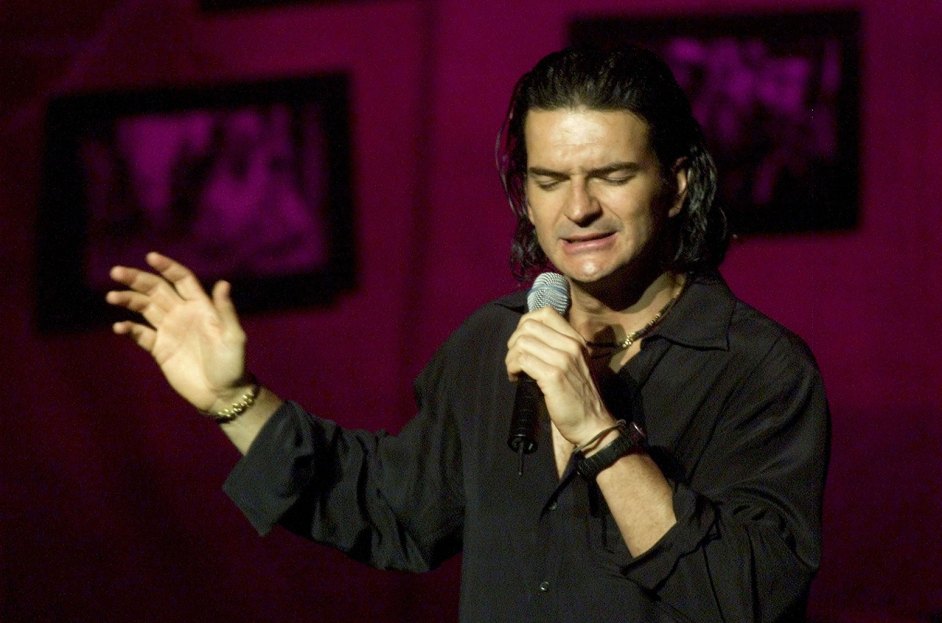See how Billboard ranks every song on the Guatemalan superstar’s seminal 1994 album.
Ricardo Arjona sings a song from his new album titled “Galeria Caribe” October 19, 2001 in Guatemala City.
Andrea Nieto/Getty Images
Ricardo Arjona has carved out a niche for himself as a socially conscious singer-songwriter who puts his heart and soul into every verse. His groundbreaking studio album Historias, released on April 14, 1994 by Sony Music, is a testament to this. 30 years later, the album has not only stood the test of time, but continues to resonate.
Certified four times platinum by the RIAA, the album’s success is undeniable. Historias marked Arjona’s debut on Billboard’s Top Latin Albums chart, where it reached No. 43. Some of its songs also entered the charts: “Libre” entered both Hot Latin Songs and Latin Pop Airplay, at No. 29 and No. 6, respectively. And “Señora de las Cuatro Décadas” reached No. 39 in Latin Airplay.
With each of his 14 tracks, the imaginative artist paints a vivid portrait of life’s many nuances. Each melody is a chapter and each lyric a character, from the epic tale of a cab driver’s fateful encounter in “Historia de Taxi” to the poignant exploration of the paradox of love in “Te Conozco”. Beneath a fusion of jazzy rock, pop and soulful guitar boleros, the Guatemalan maestro shines as a composer, delving deep into the human experience to reveal profound truths.
In commemoration of the 30th anniversary of this seminal work, the Billboard Latin and Billboard Español team pays tribute to the album that has aged gracefully — much like the protagonist of Arjona’s timeless track, “Señora de las Cuatro Décadas” — by ranking its 14 songs. Here our Historias ranking.
-
“Amor de Tele”
In “Amor De Tele,” Arjona recounts the journey of a platonic love directed towards a soap opera actress, and the disappointment that came when meeting her in person, discovering that much of what he admired on the screen did not correspond to reality. In the end, he concludes with a lament: “I fell in love with the role of a novel/ I know that you don’t exist, and I feel sorry for me.”
-
“La Noche Te Trae Sorpresas”
In the smoky ambiance of Don Pedro’s bar, Arjona spins a tale of unexpected twists and turns in “La Noche Te Trae Sorpresas.” With a swaggering rockabilly beat and the occasional solo wail of a steely guitar, Arjona sets the stage for a night of intrigue and adventure. As the rhythm sinks in, listeners are drawn into a world where chance encounters lead to unforeseen outcomes. His vivid storytelling paints a picture of a fateful encounter between a bold protagonist and a captivating woman, interwoven with themes of risk, desire, and the unpredictable nature of love. It’s a rollicking ride through the highs and lows of romance, reminding us that in the realm of the night, anything can happen.
-
“Chicos de Plástico”
A jab at those who live in a materialistic world, Arjona doesn’t hold back criticizing their superficial lifestyle. “It’s not that it’s bad to be well off, if you’ve earned it/ What’s wrong is to go bragging what your daddy gave you,” he sings spitefully in “Chicos de Plástico” (translating to Plastic Boys), almost bitter toward the guys who can get the girls simply because of their designer brands and luxury cars.
-
“Si Yo Fuera”
Bolstered by a horn section, and a jangle blues rock rhythm, “Si Yo Fuera” ponders hypothetical scenarios of being in different societal roles, such as a politician, cardinal, king, or even actress Demi Moore. Arjona uses these themes to critique societal and political norms, expressing his dissatisfaction with how things are. However, he also conveys a sense of resignation, acknowledging his role as a “passenger on this train,” he sings. Its lively rhythm and thought-provoking lyrics resonate, especially with listeners who question their place in society.
-
“Ayúdame Freud”
In “Ayúdame Freud” (or “Help Me Feud”), Arjona’s introspective journey begins before the first note is sung, as the singer-songwriter sets the scene with a dialogue between himself and his therapist, Freud. As the mid-tempo Latin pop ballad unfolds with emotional anguish, Arjona navigates the complexities of his inner world, while delving into the depths of personal struggle and the intricate dynamics of relationships. It also captures the essence of vulnerability, inviting listeners to join Arjona on his quest of self-discovery.
-
“Del Otro Lado del Sol”
This song reflects the contrasts and disappointments between the narrator’s world and the world that is observed on Earth. The lyrics depict an extraterrestrial visitor who has arrived to explore and comprehend the human world. The chorus emphasizes the deteriorating state of the world that lies beyond the sun. The lyrics imply that the connection between the downfall of the world and the rhyming of words like “tierra” with “guerra” (“earth” and “war”) and “humano” with “tirano” (“human” and “tyrant”) is not coincidental. It suggests that there is a lack of unity and cooperation among people.
-
“Me Están Jodiendo la Vida”
Composed by Arjona and Miguel Luna, the pop-rock song explores the struggles of dealing with adversities and societal pressures. Through its upbeat tempo, the Guatemalan artist expresses feelings of being a “soldier fighting against all odds, without understanding why,” he sings in Spanish. It reflects his frustration with various aspects of life, yet all he wants to do is sing. Ultimately, “Me Están Jodiendo la Vida” is a quintessential rebel rock outing that describes navigating life’s challenges.
-
“Historia del Portero”
This may be some of Arjona’s more cheesy love songs on Historias where he sings about his social status preventing him from hooking up with the girl that lives in the penthouse of a building where he works as the doorman. “I was the doorman of building 32/ You were the bourgeoisie, the penthouse princess/ That’s the way God wanted it,” Arjona sings in this southern-inspired country track powered by a lively banjo.
-
“Casa de Locos”
Accompanied by a baroque-like cartoonish melody apt for telling a good story, Arjona discusses the peculiar universe of his partner’s family in “Casa de Locos” (meaning “Crazy House”). From the grandmother to the cat and the dog, no member escapes his sharp criticism in this song. However, in the end, in a gesture of resignation, he welcomes his significant other into his own home, accepting that they may be destined to recreate the same story.
-
“Libre”
This power ballad delves into the depths of loneliness and longing about a man grappling with the aftermath of loss and disconnection. “I am free and it does not serve me,” Arjona sings with gut-wrenching delivery. As the protagonist navigates the wreckage of his existence, a haunting trumpet underscores the emotional intensity of his journey. This soulful song is an exploration of the paradox of freedom, highlighting the emptiness that can accompany liberation when faced with the absence of love and belonging.
-
“Realmente No Estoy Tan Solo”
In true Arjona fashion, this song carries a contradiction in each verse that poetically describes the absence of a loved one, but at the same time you can feel their presence. The song is carried musically by the notes of a piano found in arrangements of violins and electric guitars, while his voice deciphers those sensations of melancholy. “I have a coffee with your absence/ And I light a cigarette to the nostalgia/ I kiss your space on the neck/ Empty,” he starts off.
-
“Señora de las Cuatro Décadas”
This ballad brimming with poetry — and one of the most emblematic songs of the Guatemalan — serves as a tribute to women who have reached maturity. In this timeless ode, Arjona reflects on the beauty and allure of a woman in her 40s, describing her as a “perfect amalgam of experience and youth.” In a society often obsessed with youth, this musical gem celebrates the plenitude and grace that comes with the passage of time.
-
“Te Conozco”
The Guatemalan poet begins his hymn with a memorable piano intro and captures the irony of knowing someone you love perfectly, yet not being able to be with that person only to realize that love alone may not always be enough. This love letter expresses the feeling of understanding the person so well that you know they miss you even if they don’t admit it.
-
“Historia de Taxi”

Image Credit: Courtesy Photo You really won’t notice (or even mind) that this song is almost seven minutes longs because the storyline instantly hooks you. A storyteller at heart, and a nod to the album’s title, Arjona becomes a taxi driver in his heart-wrenching track that narrates a rather slow day on the job that changes his life. Once he picks up a gorgeous blonde in a miniskirt, things begin to unfold. She sheds a tear telling the taxi driver that her rich boyfriend has cheated on her. He offers a rather cheeky proposal and the extraordinary ride includes a shocking twist. Matching the song’s dramatic, yet riveting twists and turns is a wailing saxophone that powers “Historia de Taxi.”

